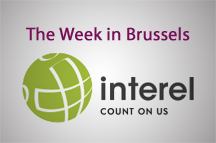 Politico offers Brussels new diet
Politico offers Brussels new diet
The hottest ticket in town this week was to the launch of Politico’s European edition. EU insiders have been captivated by the prospect of this new publication transforming the Brussels news scene in the same way that the US edition took Washington by storm.
From the outset it is clear that their ambition is high -“displace the FT as the house paper or at least give them a run for their daily euro” according to new executive editor Matthew Kaminski. He adds mischievously “we aim to be authoritative and a guilty pleasure […] too much reporting on the EU looks and tastes like oatmeal. We’re here to put on a fun party for the people who live and breathe pan-European politics”. Judging by the resources they are pouring in to the venture, they certainly mean business. At a time when the Brussels press corps continues to shrink, they are starting off with almost 40 journalists. The US edition started in 2007 with just 30 people and has grown to over 300. No comment from the FT.
Leaders try and get tough on people-traffickers
EU leaders met in Brussels on Thursday trying to find an adequate response to the scale of the tragedy in the Mediterranean. In the first ever summit solely dedicated to migration issues, the aim was to destroy the “business model” of the traffickers. Leaders agreed to set up a defence mission that would “identify, capture and destroy vessels” used by the people-smugglers and disrupt their social media networks used to attract refugees. This fell short of the demand to boost the search-and-rescue operations that were halted last year and led to accusations that the EU is more concerned with protecting its borders than saving lives. David Cameron was in a particular predicament in that he could not be seen to be soft on migration issues with Nigel Farage prophesying that “waves of millions” would travel if the EU adopted a common migration regime.
Energy Efficiency Fund dropped in EFSI vote
Jean-Claude Juncker’s flagship European Investment Fund (EFSI) hopes to see projects financed by the autumn after passing its first parliamentary hurdle. MEPs gave their negotiators a mandate this week to try and find a deal with Ministers by June. The lead committees fought off attempts to take existing money from EU transport and research funds and called on the Commission to find alternative resources from the annual budget to fill the fund until it reaches €8 billion by 2022. A Green sponsored amendment to earmark €5 billion for energy efficiency projects was rejected as part of a deal between the main political parties, confirming that the grand coalition of Christian Democrats, Socialists and Liberals are still calling the shots in the European Parliament.
First Google, now Gazprom
The EU’s feisty competition Commissioner Margrethe Vestager has followed up her high profile case against Google with an anti-trust enquiry into Russian energy giant Gazprom – a decision which her predecessor is accused of ducking. The reaction from Russia was typically forthright and a fascinating political battle lies ahead.












